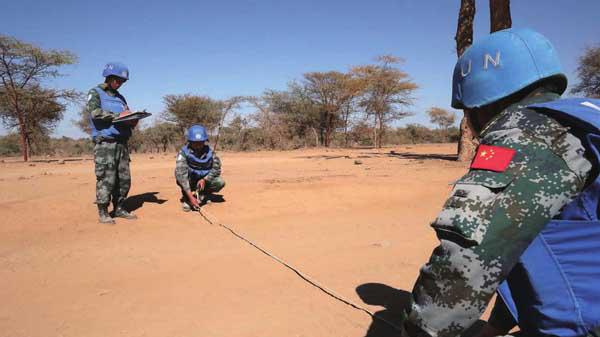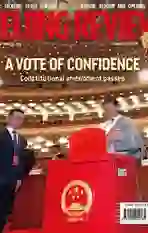New Era of Diplomacy
2018-12-04

On the sidelines of the 13th National Peoples Congress, Foreign Minister Wang Yi met with the press and answered questions on Chinas diplomacy and foreign relations raised by reporters from both home and abroad. Qu Xing, a member of the 13th National Committee of the Chinese Peoples Political Consultative Conference and Chinas Ambassador to Belgium, recently shared his views with Beijing Review on Minister Wangs press conference and Chinas diplomacy. Edited excerpts of his views follow:
Beijing Review: How would you describe the major country diplomacy with Chinese characteristics?
Qu Xing: The major country diplomacy with Chinese characteristics aims to foster a new type of international relations and to build a community with a shared future for mankind.
In the process of building new international relations, China stresses principles such as mutual respect, fairness and justice and win-win cooperation, which are also our formula for solving existing problems in todays world. Various contradictions and confl icts in current world relations are due to the fact that countries do not treat each other equally. Some countries always push to impose their political systems and social values on other countries. When rebuffed, they employ various measures to interfere with the internal affairs of these countries, which further aggravate contradictions and conflicts, causing persistent international problems. Thats why China proposes a new type of international relations focusing on mutual respect, fairness and justice and win-win cooperation.
The other goal of the major country diplomacy with Chinese characteristics is to build a community with a shared future for mankind. With the development of science, technology and transportation, our earth becomes more like a small village. If some people were extremely poor while others were extremely rich in this village, then it would be unavoidable that the poor would go to the rich for food. And in the context of globalization, such large scale movement of populations and fl ows of wealth have intensifi ed various confl icts and contradictions, for example, the refugee problem facing Europe. Against this backdrop, when talking about the international order, we need to think globally and hold out the concept of win-win cooperation. It is in this context that China put forward building a community with a shared future for mankind.
To achieve these two goals, China has proposed and implemented corresponding measures, such as the Belt and Road Initiative. To date, this initiative has received positive responses from over 100 countries and international organizations. Many cooperation agreements have been signed and many programs have been implemented in countries along the routes, some of which have already generated profi t and created a large number of jobs. Such cooperation projects under the Belt and Road Initiative have contributed to stimulating local economies and improving peoples lives.
How do you view Minister Wangs presentation on Chinas diplomacy at the press conference?
Minister Wang expounded in detail Chinas relations with the outside world at the press conference, including relations with other major countries and ties with neighboring countries and other regions such as Africa and Latin America. He also reaffi rmed Chinas stance on some hot-button issues and highlighted the four international meetings to be held in China in 2018.
When addressing abrasive questions from certain reporters, Wang appropriately explained the basic principles of Chinas diplomacy.
For example, on the Rohingya issue in Myanmar, Wang reiterated Chinas adherence to the principle of non-interference into other countries internal affairs. He clarified well the difference between Chinas efforts in mediating regional problems and some Western countriesmanipulating of other countries political development by sending troops or taking other measures.
Wang made it clear that China hopes to resolve regional disputes and conflicts through peaceful negotiations and consultation, which is totally different from intervening in the internal affairs of other countries.
When responding to the question on China-U.S. trade friction, Wang said that China and the United States may compete with each other, as competition is a basic principle of the market economy, but he also stressed that the two sides didnt have to be rivals but instead should strive to be partners. His answer clearly presented Chinas stance and optimism about China-U.S. relations.
Wang said at the press conference that although some disagreements existed between China and the EU, both sides should make efforts to be more open, tolerant and understanding of each other. As Chinas Ambassador to Belgium, how do you view cooperation and disagreement between China and the EU? Europe is different from China on the economic and social development plane, as well as on status on the international stage. Compared to Europe, China still lags behind in the construction of its infrastructure, has the problem of unbalanced and inadequate development and has more complex religious and ethnic structures. Therefore, if China adopted Europes governance mode, more problems would emerge. That explains why Wang said China and Europe should be more open, tolerant and understanding of each other. He suggested that when disagreements occur, European countries should communicate their ideas to China instead of trying to force China to adopt their methods.
At the same time, there is a lot of space for cooperation between China and Europe in economic areas. After decades of development, China has accumulated a relative abundance of capital and enjoys a vast market with great potential. The market capacity is limited in Europe, on the one hand, but it has strong research and development capabilities. Therefore, there is a large potential for technological trade, which remains untapped, between China and Europe.??
The cooperation between China and Belgium provides a good example. Belgium has strong scientific and technological research capabilities and it has created many technological inventions throughout history, such as caustic soda, internal combustion engines and iron-making. The railway from Beijing to Hankou, a central Chinese city, was built by Belgian companies in the late Qing Dynasty (1644-1911). Belgium has a small population and limited market capacity. If it cooperates more closely with China, its science and technology and patents can be better incubated into products and promoted on the global market. This is an example of win-win cooperation which can bring mutual benefi ts.
If China and Europe are more open, tolerant and understanding of each other, they can better release their potential and could reach more pragmatic cooperation, which could help to increase peoples incomes and improve peoples lives, the pursuit of all governments.
The world has been developing toward multi-polarization since the end of World War II. Although the United States is still the only super power, other powers are also emerging and becoming restraints on the United States, which could help to keep the balance and stability of international relations. Thus, China places great importance on ties with the EU and has elevated bilateral relations between them from a constructive partnership to comprehensive partnership, and to todays comprehensive strategic partnership.
There are voices which say China-France ties lead to China-Europe ties, while others believe China-Germany ties play that role. What is your opinion?
Inside the EU exist different voices on whether to promote friendship and a cooperative relationship with China, and major European countries like France and Germany have a strong say in the matter. The country promoting China-Europe ties toward the direction of mutual benefi t and win-win cooperation will be viewed as the leading power behind bilateral ties.
Although there are still some issues that they cant agree on in China-Europe relations, if a European country were to successfully reach cooperation with China on such issues, it would be seen as the leader in China-Europe relations. Words without action are empty talk, thus the leading role depends on countries concrete actions to promote further ties with China.
